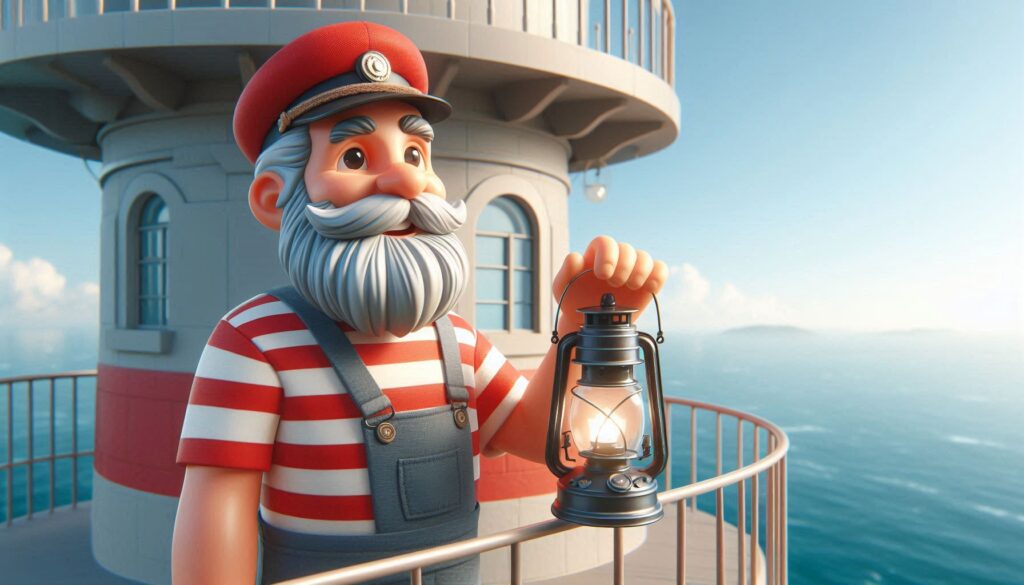Imagine earning a million dollars a year—yes, seven figures—for doing a job that sounds like something out of a movie. The role of a lighthouse keeper is steeped in history, solitude, and a sense of responsibility that very few professions can match. But here’s the twist: despite the enormous paycheck, people are reluctant to sign up for this job.
Why is that? What makes this seemingly simple job so difficult and unappealing, even with the promise of a life-changing salary? This blog dives deep into the life of a lighthouse keeper, exploring the responsibilities, challenges, and reasons why this million-dollar job remains one of the least desired positions in the modern world.
1. The History of Lighthouse Keeping
Before delving into the specifics of the modern role, it’s important to understand the history of lighthouse keeping. Lighthouses date back thousands of years, with the Lighthouse of Alexandria in ancient Egypt being one of the Seven Wonders of the Ancient World.
For centuries, lighthouses have been beacons of hope for sailors navigating treacherous waters. They stand as silent guardians against hidden reefs, rocky coastlines, and stormy seas. Historically, lighthouse keepers were essential workers, ensuring the safety of countless ships and their crews.
However, the advancement of technology, including automated systems, has significantly reduced the need for human keepers. In today’s world, the job remains but has evolved into a much more specialized and high-stakes position.
2. What Does a Lighthouse Keeper Do?
At its core, the job of a lighthouse keeper is simple: to ensure the proper functioning of the lighthouse. But the simplicity of the job description doesn’t convey the complexity and challenges of the role.



Key Responsibilities:
- Maintaining the Light
The primary role of a lighthouse keeper is to ensure that the light, often the only beacon for miles, operates perfectly. Any malfunction could lead to catastrophic accidents for passing ships. - Monitoring Weather Conditions
Keepers are often responsible for keeping track of weather patterns and sea conditions. This data is essential for maritime safety and often shared with meteorological organizations. - Maintenance and Repairs
A lighthouse is exposed to harsh weather and salty air, which accelerates wear and tear. Lighthouse keepers must perform regular maintenance on the structure and its equipment to keep everything operational. - Emergency Situations
While rare, there are times when keepers must step up as first responders in emergencies. Whether it’s guiding a stranded ship or assisting in a rescue operation, they must always be prepared. - Surviving Isolation
Perhaps the hardest part of the job isn’t the tasks themselves but the isolation. Most lighthouses are located in remote areas with little to no contact with the outside world.
3. Why the Job Pays So Much
With advancements in technology, why does this job still exist, and why does it pay so much?
1. Location and Isolation
Most lighthouses are in incredibly remote areas, often on rocky islands far from civilization. The isolation is so extreme that even the promise of a million-dollar paycheck doesn’t attract many candidates.
2. Risk Involved
Lighthouse keepers face significant risks, from extreme weather conditions to physical hazards while maintaining the structure. The role demands not just technical expertise but also courage and resilience.
3. Limited Candidates
Not everyone is willing—or able—to live in isolation, disconnected from the modern world, for extended periods. Employers have to offer high salaries to attract the few who are.
4. High-Stakes Responsibility
One mistake can lead to disaster. A faulty light or inaccurate weather report could endanger lives, making this a high-stakes job that requires unwavering focus.
4. The Challenges of Being a Lighthouse Keeper
While the paycheck may sound appealing, the job comes with numerous challenges that deter most people.
1. Isolation and Loneliness
Living in a lighthouse often means months of solitude. While some may relish the quiet, for many, the lack of social interaction can be mentally exhausting.
- Impact on Mental Health: Prolonged isolation can lead to feelings of depression, anxiety, and even hallucinations.
- Disconnection from Society: Limited communication with the outside world can leave keepers feeling cut off from family and friends.
2. Harsh Working Conditions
Lighthouses are often located in harsh environments, with extreme weather being a constant challenge.
- Stormy Seas: Waves crashing against the lighthouse can create an intimidating and even dangerous situation.
- Cold and Damp Atmosphere: Many lighthouses are located in cold, wet regions, which can be physically uncomfortable and hard on the body.




3. Physical Demands
From climbing steep stairs to repairing heavy machinery, the job requires significant physical fitness. An injury in such a remote location can be life-threatening.
4. Long Hours
A lighthouse operates 24/7, and keepers must always be alert. Whether it’s conducting repairs, monitoring weather conditions, or simply maintaining the light, the job offers little room for rest.
5. Constant Vigilance
There’s no room for error. The consequences of a malfunctioning light could be catastrophic, adding immense pressure to an already difficult job.
5. The Psychological Toll
The mental challenges of the job are as significant as the physical ones.
Isolation-Induced Stress
Living alone for months on end, with only the sea and the lighthouse for company, can lead to severe loneliness. This is compounded by the lack of modern conveniences and social interaction.
Responsibility-Induced Anxiety
Knowing that lives depend on your performance can be overwhelming. The pressure to ensure that the light never fails can lead to chronic stress and anxiety.
Burnout and Fatigue
The combination of long hours, physical demands, and mental strain can lead to burnout, making it difficult for keepers to continue their work.
6. Who Takes This Job?
Despite the challenges, some people take on the role of a lighthouse keeper.
1. Adventurers
Some are drawn to the job for the unique experience it offers. Living in a lighthouse is an adventure that few people get to experience.
2. Nature Lovers
The job appeals to those who appreciate the beauty of nature and enjoy living close to the sea.
3. Solitude Seekers
For introverts or those seeking a break from the hustle and bustle of modern life, isolation can be a welcome escape.
4. Financially Motivated Individuals
The promise of a million-dollar paycheck is enough to motivate some individuals, even if only for a short stint.
7. Lessons from the Lighthouse Job
While most people may never consider this job, there are valuable life lessons to be learned from it.
1. The Value of Solitude
Solitude can be an opportunity for self-reflection and growth. It teaches us to appreciate our own company and find peace within ourselves.
2. Resilience in the Face of Challenges
The role of a lighthouse keeper demonstrates the importance of resilience, both mental and physical, in overcoming difficult circumstances.
3. The Importance of Responsibility
Few jobs underscore the importance of responsibility as much as this one. Knowing that lives depend on your actions can be both humbling and motivating.
8. Is This Job for You?
Would you take this job? The answer depends on your personality, skills, and life goals.
Who Should Consider It?
- Those who value financial freedom and are willing to make sacrifices to achieve it.
- Individuals with technical skills and a love for adventure.
- People who can thrive in isolation and embrace the challenges of a solitary life.
Who Should Avoid It?
- Those who struggle with loneliness or require constant social interaction.
- Individuals who are not physically fit or prepared for the demands of the job.
- People who value comfort and modern conveniences above all else.
Conclusion
The $1 million-a-year lighthouse keeper job is a paradox. On the one hand, it offers financial freedom and a unique life experience. On the other hand, it demands sacrifices that few are willing to make.
For the right person, this job could be the opportunity of a lifetime—a chance to earn a life-changing salary while living a one-of-a-kind adventure. But for most, the challenges far outweigh the rewards.
So, would you take this job? The answer lies in your willingness to embrace isolation, responsibility, and the unpredictability of life on the edge of the sea. One thing is certain: the lighthouse keeper’s role, like the beacon they maintain, continues to shine as a testament to human resilience and determination.























